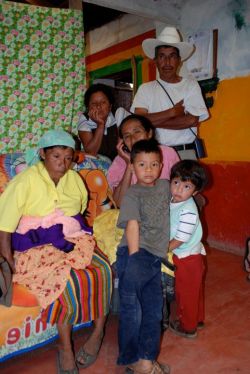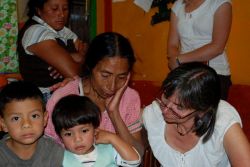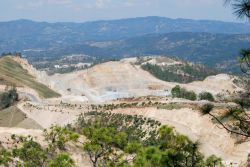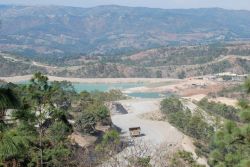Meeting with Canadian Embassy in Guatemala re: Gold Corp. mining in San Miguel
BLOG POST posted on May 26, 2010 by Michael
We are here today to discuss what we believe is a growing health crisis in Guatemala. We are referring to the physical, emotional, mental and social issues that are continuing to develop in San Miguel, Ixtuachuan since the Canadian mining company Gold Corp began mining in that area in 2004. As nurses, our ethical responsibilities laid out in our professional code of ethics include the promotion of health and well-being, preservation of dignity, promotion of justice and accountability.
Our Governing body is the Canadian Nurses Association (CNA). The CNA has taken many progressive positions on health issues, including global health and equity and human rights. As nurses, we have the right and responsibility to raise awareness of the root causes of inequity in global health and to participate in finding solutions.
Health is a global issue and a fundamental human right, which should be accessible to all. The way to achieve health is to ensure adequate income, food, education, shelter, a stable eco-system, sustainable resources, peace, social justice and equity for all. All global initiatives should take into consideration the potential impact on human health and access to these determinants of health.
The Canadian Government can be a strong advocate for Global health and equity by initiating and funding research, influencing international policy, working to improve the factors that determine health in Countries at risk and building alliances for peace.
The Social Determinants of Health
In the 1986, the World Health Organization convened in Ottawa under the Health Minister Jake Epp and implemented the Health Promotion Document, within which the twelve Social Determinants of Health are contained. These twelve determinants are: income and social status; social support networks; education; employment/working conditions; physical environments; biology and genetic endowment; personal health practices and coping skills; healthy child development; health services; gender; culture; and the social environments. When these social determinants are unmet, the health of a population suffers. The importance of the social Determinants of Health in achieving and maintaining adequate individual and systemic health is currently the foundation of the Canadian health care system and has been the basis of our nursing curriculum for the past three years. Said determinants profound and intricate relationship to the health of the people has never been more clearly displayed than during our time in San Miguel, we have chosen three to explore in depth. These are income and social status; social support networks; and physical environments.
Physical Environment
Physical Environment is one of the aforementioned Social Determinants of Health. Basic necessities for survival include water, food and shelter. Personal testimonies of people from San Miguel Ixtuahcan have illustrated many extreme negative impacts the local Gold Corp mine is having on these basic necessities. Negative impacts on Physical Environment include water contamination, increasing water scarcity, food contamination and infrastructural damage.
Donia Modesta, a local woman from San Miguel has for the first time in sixty years suffered from a dry well. ADISMI, Association of Integral Development of San Miguel Ixtuahcan explained the Gold Corp mine uses 250,000 litres of water per hour in the mining process.
Don Miguel, a San Miguel local farmer is extremely concerned with water contamination. Attempting to initiate an organic coffee plantation he hired a Costa Rican engineer to assess his proposal. He was turned down due to the extreme contamination of Rio Cuilco, which would irrigate his crops. Rio Cuilco is the primary source of irrigation in agriculture around San Miguel. Tributaries flowing by tailings ponds produced by the mine enter Rio Cuilco.
Juan Mendez explained that for the first time cattle drinking from Rio Cuilco have been dying of unknown causes. The local communities cattle, agriculture and water resources are being devastated for the first time in their lives.
During several of our meetings with San Miguel locals we witnessed significant infrastructural damage to their homes. Enormous cracks are threatening the very foundations of the homes in which they live. Juan Mendez explained that the explosives used in blasting for the mine have resulted in the enormous infrastructural damage. Mining employees denounce this position saying that the damage has been caused by the families stereo systems and by their molinas ( household appliances used to grind corn for tortillas).
Another facet of Physical Environment is the pervasive violence experienced that was expressed by the people of San Miguel. The testimonies of the people were riddled with fear, anguish, anger and hopelessness. We watched as both children and elders wept as they told their stories. They spoke of people being dismembered, tortured, decapitated and disappeared.
Crisantha Lopez, a local San Miguel woman in her late sixties told us that the violence has been ongoing and as recent as within the last year. Her seventy eight year old female neighbour who would not sell her land to the mine was brutally dismembered and murdered. Her eyes were ripped out, her tongue was cut off and she was left naked and lifeless. Can you imagine the divisions created in San Miguel?
The majority of the San Miguel locals opposing the mine state they have received numerous death threats. They state there is no system to find justice for these horrible atrocities. If they bring their concerns to the authorities including the police they are criminalized.
Catalina Perez said, “We worry every day, is tonight the night they will bring me in?” We are talking about local women who are being criminalized for voicing concerns regarding the health implications of the mine. Eight elderly, illiterate indigenous women who non- violently approached the mine voicing concerns now have arrest warrants. This is a gross distortion of law when the Guatemalan authorities make it criminal for a citizen to non-violently defend their basic human rights.
Income and Social Status
Income and social status are the greatest determinants of health as they underlie every other determinant with the power to bolster it, or bring it down. We met with several community members of San Miguel Ixtahaucan who repeatedly reported being severely impacted by the mine in terms of their income and social status.
As previously mentioned, after great effort on the part of the community to build an organic coffee co-op, a project that would have greatly benefited the community financially, they were denied due to contamination. Farming being the main source of income for local indigenous economies, effects in this area have a profound impact. We were told of instances of livestock dying, crops failing due to wells drying, wells which have been used for generations without fail.
Another community member brought us into his home and showed us the tremendous cracks which have resulted from blastings in the mine. These cracks were such that one room was separating from the entire home, and one area of the floor had fallen by one inch. In Canada, this house would have been condemned. The financial burden on this family to rebuild their house is enormous and in no way guarantees that the issue will not return. One story we heard was of a family who rebuilt their house and in one month, the cracks had returned, such that the house was unsafe to live in.
One percent of the royalties from the mine remains in Guatemala, and does not necessarily benefit the community of San Miguel itself. The organization ADISME shared with us that out of 40,000 people in San Miguel, only 600 people have been employed in the mine in the last 6 years. Therefore, the amount of money returning to the community is minimal.
Social Support Networks
Of all the terrible impacts of the mine in San Miguel, Ixtuhuacan, we heard time and time again that the conflict and subsequent division of the Mom communities is the most devastating for the people. Social support networks are the second strongest indicator of the health of a person of population. As such, this significance of this community division, coupled with the inability of the Guatemalan judicial system to punish violent crimes and/or murders, cannot be overlooked or undervalued. The mine appears to have played a role in this division by increasing economic disparities within the community and fostering a sense of mistrust, fear, and degradation. As one gentleman said, “We believe, as Indigenous people, that we have a right to life, a right to our land. They treat us no better than insects. By dividing us they leave us smaller as a people.” The recent history of Guatemala must also be taken into account. A 36 year civil war took many lives and served as a tool of intimidation to silence the claims of injustice being made by the Mayan people. Today, the pervasive violence, intimidation tactics, and gross distortions of law have irreparably torn the social fabric of the community of San Miguel. A climate of fear and unjust persecution serves to divide the community, silence concerns, and act as a profound source of stress and cultural annihilation.
Conclusion
As you have heard we, as nurses see the link between people’s social condition and their health and therefore are in a crucial position to advocate for policies that would increase access to factors improving health.
From the first day of our nursing education, we have taught about the social determinants of health. As outlined here, we have seen these internationally recognized and Canadian specific social determinants of health profoundly compromised by the Canadian corporation, Gold corp. in its mining operation in San Miguel.
Thus, as Canadian senior student nurses – in keeping with the Canadian Nurses Association codes of ethics, with the backing of the multiple communities, including 800+ people who have supported our advocacy work around Gold Corp’s Marlin mine in San Miguel, we have some recommendations – which are consistent with the wishes of the people we met in San Miguel.
Our 5 recommendations are as follows:
1. Stop all mining activities immediately
2. Initiate an independent study into the mining practices by Gold corp. in San Miguel.
3. Consider the dignity and human rights of all those affected by the mine – including the people whose stories you’ve just heard.
4. We must take our fundamental responsibility as a Canadian citizen seriously. What I mean by this is that we exercise the most basic logic taught to us as children: Do Unto Others as you’d have them do Unto you. If Canadian companies are not taking the dignity and human rights of the community of San Miguel into consideration, they should not be working there at all. If this corporate practice would not be accepted in Canada, it cannot be tolerated in Guatemala. There is no double standard between Canada and Guatemala.
5. Lastly, we ask that you be cognizant of the fact that Canadians are often viewed as global leaders; however, with a growing outrage at current mining practices in San Miguel – within the context of a global consciousness on the climate crisis; including Norway’s disinvestment from Barrick gold, and a recent documentary critical of Canadian mining practices in Guatemala aired nationally on CTV. Failure to act now will profoundly tarnish our Canadian image. For the truth is like the sun, once it is out it is there for all to see. We promise to bring these stories home.
-3rd year nursing students: Teeka, Ivan, Chelsea, Danielle, Mike, Shaunna, Carola, Rachel and Julia
The site for the Vancouver local of The Media Co-op has been archived and will no longer be updated. Please visit the main Media Co-op website to learn more about the organization.




Comments
San Miguel
Thank you for doing this,
i am a journalism student and have made three trips to Guatemala. In Alaska we have some horrid problems with goldmines too.
its hard for westerners to foster sustainable development, especially when they are working against the mighty financial interests of globalization and a company willing to make reprisal attacks against locals.
solidarity,
joshuatreetucker@gmail.com
Wow! It was so powerful to
Wow! It was so powerful to read it again! To believe that we did this...it is just such a testament to Mary Ann Morris' vision and the courage of Selkirk College to give us this opportunity. We met it head on, and I feel, once again, so proud of us as a group, as nurses, and as the family we became down there.
All my love to Guatemala! My heart and prayers that Canadians will continue to take notice and that these atrocities, committed in our name, be stopped!
Teeka Ferguson